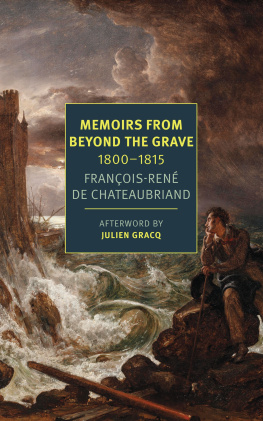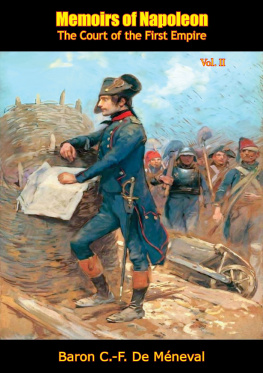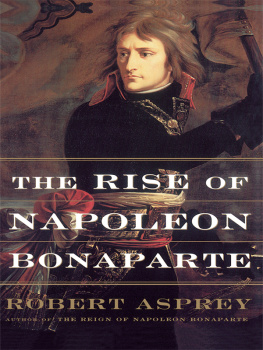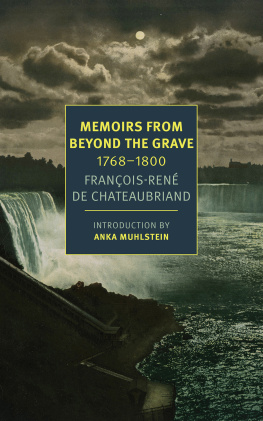FRANOIS-REN DE CHATEAUBRIAND (17681848) was born in Saint-Malo, on the northern coast of Brittany, the youngest son of an aristocratic family. After an isolated adolescence, spent largely in his fathers castle, he moved to Paris not long before the Revolution began. In 1791, he sailed for America but quickly returned to Europe, where he enrolled in the counterrevolutionary army, was wounded, and emigrated to England. The novellas Atala and Ren, published shortly after his return to France in 1800, made him a literary celebrity. Long recognized as one of the first French Romantics, Chateaubriand was also a historian, a diplomat, and a staunch defender of the freedom of the press. Today he is best remembered for his posthumously published Memoirs from Beyond the Grave.
ALEX ANDRIESSE was born in Cedar Rapids, Iowa, in 1985. In addition to Memoirs from Beyond the Grave, he has translated the work of Roberto Bazlen, Italo Calvino, and Marcel Schwob. He is the editor of The Uncollected Essays of Elizabeth Hardwick (published by NYRB Classics) and an associate editor at New York Review Books.
JULIEN GRACQ (19102007) was born Louis Poirier in Saint-Florent-le-Vieil, a small village in western France. His first book, The Castle of Argol (1938), was praised by Andr Breton as the first surrealist novel. Opposed to publicity and self-promotion, he refused the Prix Goncourt when he was awarded it for his 1951 novel, The Opposing Shore. His novel Balcony in the Forest (1958) is published by NYRB Classics.
MEMOIRS FROM BEYOND THE GRAVE
18001815
FRANOIS-REN DE CHATEAUBRIAND
Translated from the French by
ALEX ANDRIESSE
Afterword by
JULIEN GRACQ
NEW YORK REVIEW BOOKS

New York
THIS IS A NEW YORK REVIEW BOOK
PUBLISHED BY THE NEW YORK REVIEW OF BOOKS
435 Hudson Street, New York, NY 10014
www.nyrb.com
Copyright 2022 by NYREV, Inc.
Translation copyright 2022 by Alex Andriesse
Afterword copyright 1960 by Julien Gracq
All rights reserved.
Cover image: Franz Ludwig Catel, Night Piece from the Closing Scene of Ren, c. 1820; Thorvaldsens Museum, Copenhagen; photograph: Jakob Faurvig, Thorvaldsens Museum (B111)
Cover design: Katy Homans
Library of Congress Cataloging-in-Publication Data
Names: Chateaubriand, Franois-Ren, vicomte de, 17681848 author. | Andriesse, Alex translator.
Title: Memoirs from beyond the grave: 17681800 / by Franois-Ren de Chateaubriand ; introduction by Anka Muhlstein ; translation by Alex Andriesse.
Description: New York: New York Review Books, 2018.
Identifiers: LCCN 2017025073 (print) | LCCN 2017028760 (ebook) | ISBN 9781681376189 (epub) | ISBN 9781681376172 (alk. paper)
Subjects: LCSH: FranceHistoryConsulate and First Empire, 17991815. | Napoleon I, Emperor of the French, 17691821Contemporaries.
Classification: LCC DC255.C4 (ebook) | LCC DC255.C4 A3 2017 (print) | DDC 944.04dc23
LC record available at https://lccn.loc.gov/2017025073
ISBN 978-1-68137-618-9
v1.0
For a complete list of titles, visit www.nyrb.com
CONTENTS
MEMOIRS FROM BEYOND THE GRAVE
BOOK THIRTEEN
1.
SOJOURN IN DIEPPETWO SOCIETIES
Dieppe, 1836; Revised in December 1846
Y OU KNOW that I have moved from place to place many times while writing these Memoirs, that I have often described these places, spoken of the feelings they inspired in me, and retraced my memories, mingling the stories of my restless thoughts and sojourns with the story of my life.
You see where I am living now. This morning, out walking on the cliffs behind the Chteau de Dieppe, I gazed at the archway that leads to those cliffs by means of a bridge thrown over a moat. Through that same archway, Madame de Longueville escaped from Queen Anne of Austria. Stealing away on a ship that set sail from Le Havre, she landed in Rotterdam and rendezvoused in Stenay with Marshal de Turenne. The great captains laurels had by then been sullied, and the exiled tease treated him none too well.
Madame de Longueville, who did honor to the Htel de Rambouillet, the throne of Versailles, and the city of Paris, fell in love with the author of the Maxims and tried her best to be faithful to him. The latter lives on thanks less to his thoughts than to the friendship of Madame de La Fayette and Madame de Svign, the poetry of La Fontaine, and the love of Madame de Longueville. So you see the value of having famous friends.
The Princesse de Cond on her deathbed said to Madame de Brienne, My dear friend, write to that poor wretch in Stenay and acquaint her with the state in which you see me, so that she may learn how to die. Fine wordsbut the princess was forgetting that she had once been courted by Henri IV, and that, when her husband took her to Brussels, she yearned to find her way back to the Barnese, to climb out a window at night and ride thirty or forty leagues on horseback. She was at that time a poor wretch of seventeen.
At the foot of the cliff, I found myself on the high road to Paris. This road rises steeply as it leaves Dieppe. To the right, on the ascendant line of an embankment, stands a cemetery wall; along this wall is a wheel for winding rope. Two rope-makers, walking backward side by side, swinging their weight from one leg to the other, were singing together in low voices. I pricked up my ears. They had come to these two lines in Le Vieux Caporal, that fine poetic lie which has led us where we are today:
Qui l-bas sanglote et regarde?
Eh! cest la veuve du tambour.
The two men sang the refrain, Conscrits, au pas; ne pleurez pas... Marchez au pas, au pas, in such manly and melancholy voices that tears welled in my eyes. As they kept in step and wound their hemp, they seemed to be spinning out the old corporals dying moments. I cannot say what share of this glory, so forlornly disclosed by two sailors singing of a soldiers death in plain view of the sea, belonged to Branger.
The cliff had put me in mind of monarchical grandeur, the road of plebeian celebrity, and I now compared the men at these two ends of society. I asked myself to which of these epochs I would prefer to belong. When the present has vanished like the past, which of these two forms of fame will most attract the attention of posterity?
And yet if facts were everything, if in history the value of names did not counterweigh the value of events, what a difference between my days and the days that passed between the deaths of Henry IV and Mazarin! What are the troubles of 1648 compared to the Revolution that has devoured the old world, of which it will die perhaps, leaving behind neither an old nor a new society. The scenes I have described in my Memoirsare they not incomparably more important than those recounted by the Duc de La Rochefoucauld? Even here in Dieppe, what is the blithe and voluptuous idol of seduced, insurgent Paris set beside Madame la Duchesse de Berry? The cannon fire that announced the royal widow to the sea sounds no longer; those blandishments of powder and smoke have left nothing on shore except the moaning waves.
The two Bourbon daughters, Anne-Genevive and Marie-Caroline, are nowhere to be found; the two sailors singing the song of the plebeian poet will sink into obscurity; Dieppe is void of me. It was another I, an I of early days long gone who lived in these places, and that I has already succumbed, for our days die before us. Here, you have seen me as a sublieutenant in the Navarre Regiment exercising recruits on the shale. Here, you have seen me exiled by Bonaparte. Here, you will see me once more, when the days of July take me by surprise. Here I am again, and here I take up my pen one more time to continue my Confessions.










